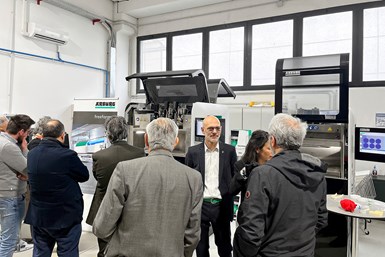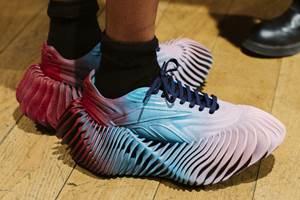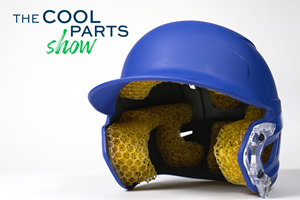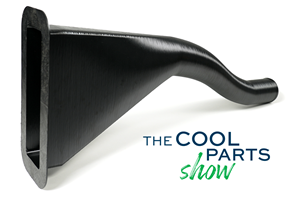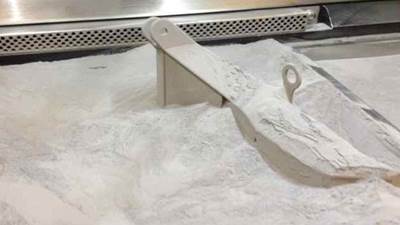Arburg Opens Faberlab Additive Center in Italy
The goal for the center is to demonstrate the potential of industrial additive manufacturing to prospective and existing customers of 3D printing technology on real machines.
Dr. Didier von Zeppelin, an expert from Arburg, explains the potential of Arburg Plastic Freeforming on the two freeformers directly. Photo Credit: Arburg
The “Faberlab powered by Arburg” Additive Center has officially opened. The center at Faberlab is a service provider for industrial additive manufacturing (AM), offering companies in the region an opportunity to familiarize themselves with additive machines from Arburg and innovatiQ in practical situations.
The opening follows a year-long planning and development phase for the factory in which the two companies will collaborate at Faberlab’s Origgio location in Milan, Italy. The aim is to demonstrate the potential of industrial AM to prospective and existing customers of 3D printing technology on real machines. A freeformer 200-3X, a high-temperature freeformer 300-3X and an innovatiQ TiQ 5 printer with a large build chamber for processing high-performance thermoplastics is available at Faberlab.
It is said customers benefit from the close collaboration between Faberlab and Arburg, and the expertise the two companies have pooled. The knowledge surrounds not only the technology itself but also services related to industrial AM and across the entire value chain from development to production. This includes rapid prototyping, component design and training.
According to Arburg, until now, no other center in Italy has been able to offer this expertise to companies, research institutes or training facilities. Arburg is providing a freeformer 200-3X, a high-temperature freeformer 300-3X and an innovatiQ TiQ 5 printer with a large build chamber for processing high-performance thermoplastics. Ivan Panfiglio, manager for additive manufacturing in Italy, is the point of contact at Arburg for customers of this technology.
This pilot project is based on the Arburg Prototyping Center (APC), which the company operates at its headquarters in Lossburg as well as at its branches in the USA and China. Now, customers can have benchmark components manufactured and materials qualified in Italy as well. Having strategically expanded the reach of its AM activities in this way, Arburg can now specifically meet local expectations and cater to the needs of the Italian market as a whole. The on-site team is able to support Freeformer and TiQ customers even faster and in a more specific, practical way.
Faberlab, in turn, has developed high-caliber expertise and knowledge in recent years through its work for the mechanical engineering, medical technology, aerospace, automotive and plant engineering industries. It now brings this know-how to the collaboration.
To help potential users become more familiar with the technology, existing and prospective customers are given the opportunity to participate in technology training courses and work with the machine themselves on-site. The center is also equipped with laser cutting machines, formlabs and cutting edge digital manufacturing technologies that enable the object being manufactured to have a customized additive design.
“3D technology and its reach is of fundamental importance at a time when companies need innovations to reduce the time and cost required to realize projects,” says Dr. Victor Roman, Arburg managing director. “By the same token, the partnership developed with Faberlab is an integral part of this process and an element that we consider strategic for the Italian market as a whole."
- Learn more about Arburg’s Freeformer 200-3X and Freeformer 300-3X machines which are both designed as open systems utilizing the company’s Plastic Freeforming process for custom-configured additve manufacturing. The system is said to meet individual user requirements by adjusting slicing, droplet size and process regulation to influence the layer-by-layer build process utilizing a broad range of materials.
- Check out this product post about the Arburg Freeformer 750-3X 3D which provides more space inside the build chamber for larger components. It is well suited for the rapid series production of large components or several articles per construction order.
Related Content
Concept Sneaker Boasts One-Piece 3D Printed TPU Construction
The Reebok x Botter Concept Sneaker Engineered by HP premiered at Paris Fashion Week, hinting at manufacturing possibilities for the future of footwear.
Read More3D Printed Lattices Replace Foam for Customized Helmet Padding: The Cool Parts Show #62
“Digital materials” resulting from engineered flexible polymer structures made through additive manufacturing are tunable to the application and can be tailored to the head of the wearer.
Read MoreAircraft Ducts 3D Printed in Composite Instead of Metal: The Cool Parts Show #68
Eaton’s new reinforced PEKK, tailored to aircraft applications, provides a cheaper and faster way to make ducts compared to formed aluminum.
Read MoreQ&A With Align EVP: Why the Invisalign Manufacturer Acquired Cubicure, and the Future of Personalized Orthodontics
Align Technology produces nearly 1 million unique aligner parts per day. Its acquisition of technology supplier Cubicure in January supports demand for 3D printed tooling and direct printed orthodontic devices at mass scale.
Read MoreRead Next
Postprocessing Steps and Costs for Metal 3D Printing
When your metal part is done 3D printing, you just pull it out of the machine and start using it, right? Not exactly.
Read MoreProfilometry-Based Indentation Plastometry (PIP) as an Alternative to Standard Tensile Testing
UK-based Plastometrex offers a benchtop testing device utilizing PIP to quickly and easily analyze the yield strength, tensile strength and uniform elongation of samples and even printed parts. The solution is particularly useful for additive manufacturing.
Read MoreCrushable Lattices: The Lightweight Structures That Will Protect an Interplanetary Payload
NASA uses laser powder bed fusion plus chemical etching to create the lattice forms engineered to keep Mars rocks safe during a crash landing on Earth.
Read More



